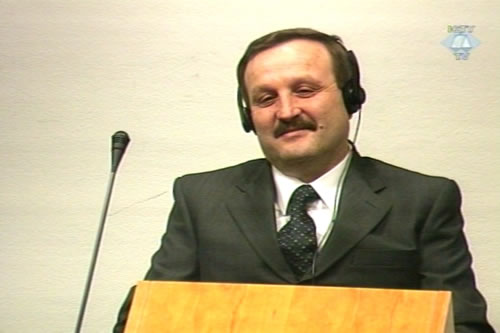Home
PROSECUTOR: NO JUSTIFICATION FOR MARTIC'S CRIMES
Prosecution delivers opening statement as Milan Martic's trial begins. The accused responds with a statement given without taking the solemn oath, accusing the prosecutor of "switching the roles of the criminals and victims" and announcing he would "prove the innocence of [his] people"
 Milan Martic in the courtroom
Milan Martic in the courtroom The conflict in Croatia was "not one-sided", certain developments on the Croatian side "undoubtedly contributed to raising the tensions and the ethnic conflict", the new authorities in Croatia were "insensitive" to the anxiety of the Serb population caused by "dragging up the symbols from the past…" but in legal and factual terms, nothing the Croatian side did could justify the criminal offences described in the indictment," prosecutor Alex Whiting said in his opening statement at the trial of Milan Martic, former interior minister and president of the former Republic of Serbian Krajina.
The crimes that "cannot be justified" are qualified in the 19 counts of the indictment as crimes against humanity and violations of laws and customs of war. Martic is charged with participation, between August 1991 and August 1995, in a joint criminal enterprise, where he, " acting individually or in concert with other[s] – planned, ordered and instigated persecutions, extermination, murders, detention, torture, deportation, wanton destruction and plunder of private and public property in the territory of Croatia and Bosnia and Herzegovina, and the shelling of Zagreb in May 1995. The goal of the enterprise, the prosecution alleges, was to "forcibly and permanently" remove the non-Serb population from the parts of the Croatian territory Martic and other participants in the joint criminal enterprise considered to be Serbian. According to the prosecutor, those crimes were a "logical and predictable consequence" of that goal.
In the 90-minute opening statement, prosecutor Whiting presented an overview of the evidence the prosecution intends to adduce. He briefly described the police and political career of the accused, his involvement in "promoting the ethnic separation and fomenting fear of genocide", his ties with Jovica Stanisic and Frenki Simatovic, the assistance he received from the Serbian MUP and the JNA and his unreserved loyalty to Slobodan Milosevic. The prosecutor said it "was stronger than his political ties in Krajina".
The prosecutor described briefly some of the crimes committed against Croatian civilians in the villages of Dubica, Bacin, Cerovljani, Saborsko, Poljanak, Skabrnja and Nadin. Several hundred people were killed there, mostly the elderly and women. The prosecutor spoke in greater detail about the rocket attack on Zagreb on 2 and 3 May 1995, claiming it was a "pure reprisal" aimed at "terrorizing the civilians". He also noted that in his public statements in 1995 and 1996, Martic had boasted of having personally ordered the attack.
Martic's defense counsel Predrag Milovancevic opted to present his opening statement at the beginning of the defense case. The accused addressed the Chamber in a statement he gave without taking the solemn oath. Before Martic started his speech, Presiding Judge Moloto told him he had the right to remain silent, warning him that anything he said could be taken as evidence.
In his 50-minute statement, Milan Martic denied all the allegations in the indictment as "inaccurate and arbitrary", accusing the prosecutor of having "switched the roles of the criminals and victims". Outlining his defense strategy which will, as he said, "prove the innocence of [his] people", Martic stated that the gravest crimes against international law – crimes against peace – were committed by the "separatist leaderships of Croatia, Slovenia and Bosnia and Herzegovina and by the international factors that supported this". According to Martic, the prosecution "gave amnesty" to the real villains and turned their crime into "an aggressive onslaught of the Serb people in Croatia aimed at creating a monstrous Serb state through the commission of monstrous crimes".
After the opening statement of the prosecutor and the statement made by the accused, the trial was adjourned until 16 January 2006, when the prosecution is to call its first witness, identified today as M001. The prosecutor described the witness as a "key political figure in the area where the crimes were committed", saying he was "the president of the Serb region in Krajina".
